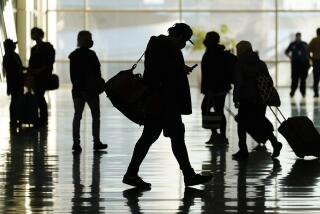Open International Skies
- Share via
Commercial aviation has soared in the century since the Wright brothers took flight. But in terms of the business of ferrying passengers and cargo across the Atlantic Ocean, relatively little has changed since 1944 when U.S. and European delegations met in Chicago to set international regulations. The propeller airliner of that era is long gone, but carriers still labor under bilateral agreements designed to protect narrow national interests by restricting who may fly where.
Deregulation of the domestic U.S. airline industry in 1978 produced lower fares and more flights on popular routes. The deregulation wave that broke in Europe during the 1990s gave rise to such low-cost regional alternatives as Ryanair and easyJet. Yet even as international travel is battered by a poor global economy, lingering effects of terrorist attacks and SARS, international flight rules are largely frozen in time.
The air travel treaties that dictate where and when airlines can fly between the United States and individual European countries end up protecting the financial interests of big airlines -- including American Airlines, British Airways and Air France -- but the rules inflate prices and reduce choice for travelers because they prevent efficient competition.
The international airline industry sees the need for change. That is what’s pushing mergers planned by British Airways (with Spain’s Iberia Airlines) and Air France (with KLM Royal Dutch Airlines). Airlines are also bypassing bilateral agreements with marketing partnerships among several airlines that allow flights to more places to be booked more freely.
The United States, which has already forged less-restrictive agreements with 11 European nations, will meet with European delegations in Brussels Dec. 8 to discuss additional changes. The European Union is moving toward a single commercial aviation market, and regulations must follow suit.
Truly open skies would give European airlines the right to fly domestic routes in the U.S. and vice versa. This would also require eliminating barriers, particularly in the United States, that hinder cross-border airline mergers. One thing that shouldn’t change is the renewed emphasis on safety and security.
Consumers are jumping into their Daimler-Benz sedans, purchasing life insurance from John Hancock Financial Inc. (being acquired by a Canadian company) and buying Hellmann’s Real Mayonnaise and Lipton tea from Unilever, a company formed decades ago when British and Dutch competitors merged.
Outmoded regulations that are still needlessly restricting competition across the Atlantic should fly off into history.
More to Read
Inside the business of entertainment
The Wide Shot brings you news, analysis and insights on everything from streaming wars to production — and what it all means for the future.
You may occasionally receive promotional content from the Los Angeles Times.










